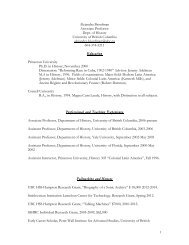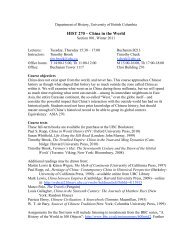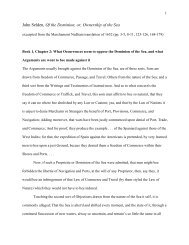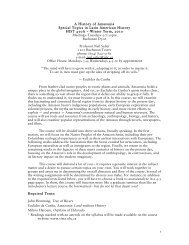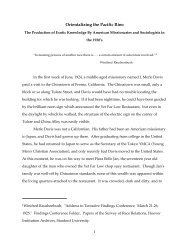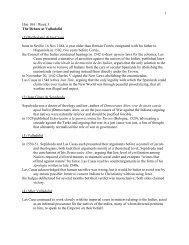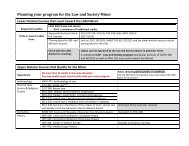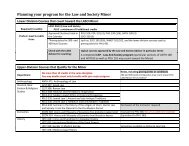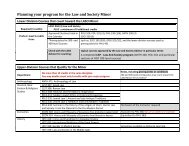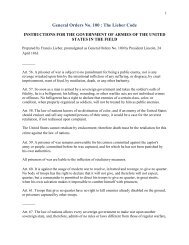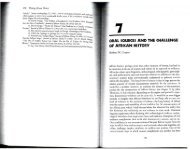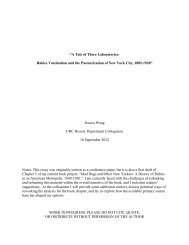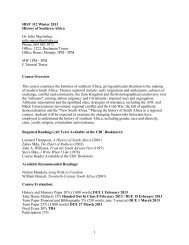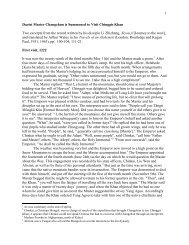VANCOUVER - History, Department of - University of British Columbia
VANCOUVER - History, Department of - University of British Columbia
VANCOUVER - History, Department of - University of British Columbia
You also want an ePaper? Increase the reach of your titles
YUMPU automatically turns print PDFs into web optimized ePapers that Google loves.
Joy Dixon and Jeffrey Alexander, in their Nelson Guide to Writing in <strong>History</strong>, second<br />
edition (2010), write the following about research proposals: “Once you have identified worthwhile<br />
sources and appropriate research questions, it is time to draft a proposal that draws them all<br />
together…here are some general tips on how to approach it. You should begin by outlining your<br />
topic. Describe its importance and discuss your sources, both primary and secondary, in detail.<br />
Summarize the sorts <strong>of</strong> historical debates that authors have been having about the subject. (This<br />
brief discussion <strong>of</strong> the existing secondary sources is known as a literature review). Finally,<br />
introduce and discuss your proposed research questions along with any preliminary conclusions<br />
or expectations that have been drawn. These can later be developed into the central argument, or<br />
thesis, <strong>of</strong> your essay. Of course, your final conclusions may contrast sharply with your initial<br />
expectations. This is one <strong>of</strong> the things that characterizes good research. Just as a police <strong>of</strong>ficer<br />
investigating a crime may have to change hypotheses as she or he uncovers new evidence, you<br />
should also be prepared to discover unexpected and interesting results as you proceed with your<br />
research.” (pp.34-35)<br />
Week 10<br />
Mar.6/8<br />
<strong>VANCOUVER</strong> AND GLOBALIZATION<br />
A. Required by all…………………………………………………………………………<br />
1. Katharyne Mitchell, Crossing the Neoliberal Line: Pacific Rim Migration and<br />
the Metropolis (Philadelphia: Temple <strong>University</strong> Press, 2004), chap. 2,<br />
“Vancouver Goes Global,” pp.40-86 and 227-234 (course pack)<br />
2. Daniel Hiebert, “Immigration and the Changing Social Geography <strong>of</strong> Greater<br />
Vancouver,” BC Studies, no.121 (Spring 1999): 35-82 (available online<br />
through the UBC Library under journals OR through the BC Studies web<br />
page).<br />
3. Charles Montgomery, “Futureville,” Canadian Geographic, May/June 2006:<br />
44- 60 (available online in UBC Library through Academic Search).<br />
Complete).<br />
B. Additional for Student Presenters.................................................................................<br />
4. David Ley, “Between Europe and Asia: The Case <strong>of</strong> the Missing Sequoias,”<br />
Ecumene, vol.2, no.2 (1995): 185-210 (course pack).<br />
5. Laura Madokoro, “Chinatown and Monster Homes: The Splintered Diaspora<br />
in Vancouver,” Urban <strong>History</strong> Review, vol.39, no.2 (2011): 17-24 (available<br />
online through the UBC Library under journals OR through the Urban<br />
<strong>History</strong> Review web page).<br />
C Assignment for Presenters: Write a 4-5 page (double-spaced) essay identifying the<br />
arguments presented in these five readings and discuss how you would evaluate the<br />
insights to be drawn from these readings about the impact <strong>of</strong> globalization on<br />
Vancouver.<br />
.<br />
Week 11( Mar. 13/15) RESEARCH WEEK: NO CLASSES<br />
6



